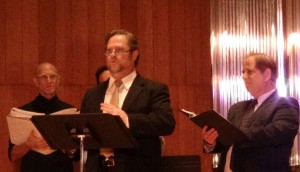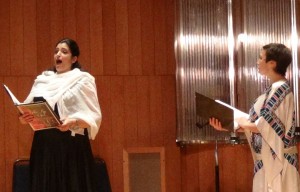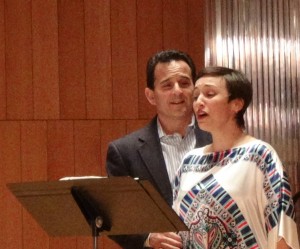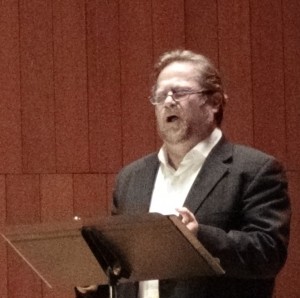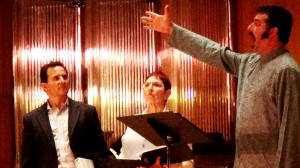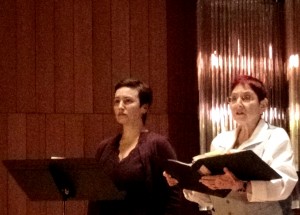Hannah – A Review by Jonathan Dzik
Comments Off on Hannah – A Review by Jonathan DzikJanuary 24, 2015 by Admin
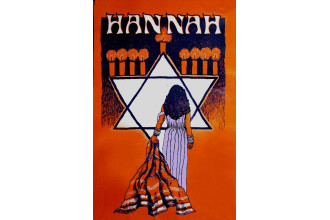
Hannah
Music by Leonard Lehrman
Libretto by the composer and Orel Odinov Protopopescu
at Hebrew Union College–Jewish Institute of Religion
December 23, 2014
Cast
Nikanor, the local Greek-Syrian hegemon (overlord) – Erik Contzius
Mattathias, high priest & Hasmonean family patriarch – Raphael Frieder
Zipporah, his wife – Janet Leuchter
Jonathan, their eldest son – Moshe Bear
Judah, their second son (later called Judah Maccabee–the hammer) – Jonathan Kline
Simon, their youngest son – Helene Williams
Hannah, their daughter – Meredith Greenberg
Eleazar, their nephew, Hannah’s betrothed – David Katz
Dinah, their niece, Eleazar’s sister, Jonathan’s betrothed – Galit Dadoun Cohen
with The Metropolitan Philharmonic Chorus
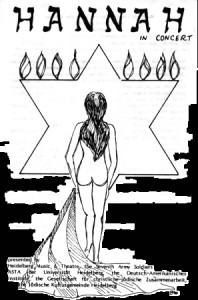 When one thinks of operas set in ancient times in the Middle East, such works as Nabucco (Verdi), Samson et Dalila (Saint-Saens) and Salome (Richard Strauss) come to mind. Set in the year 168 B.C.E. in the town of Modi’in (halfway between Jerusalem and today’s Tel Aviv), Hannah‘s action takes place during the reign of King Antiochus and his Seleucid followers, pagans of mixed Greek and Syrian descent, during the time of the revolt of the Maccabees and the events leading up to the Chanukah story. Mattathias, the High Priest of Judea, and his five sons, led by Judah Maccabee, are the traditional heroes of this episode in history. Little is known factually about Hannah, their sister, or whether she ever lived. Based on lost legends of the daughter of Mattathias, Hannah tells the story of her own rebellion against tyranny, both national and personal. It combines myth and history with religious and social criticism.
When one thinks of operas set in ancient times in the Middle East, such works as Nabucco (Verdi), Samson et Dalila (Saint-Saens) and Salome (Richard Strauss) come to mind. Set in the year 168 B.C.E. in the town of Modi’in (halfway between Jerusalem and today’s Tel Aviv), Hannah‘s action takes place during the reign of King Antiochus and his Seleucid followers, pagans of mixed Greek and Syrian descent, during the time of the revolt of the Maccabees and the events leading up to the Chanukah story. Mattathias, the High Priest of Judea, and his five sons, led by Judah Maccabee, are the traditional heroes of this episode in history. Little is known factually about Hannah, their sister, or whether she ever lived. Based on lost legends of the daughter of Mattathias, Hannah tells the story of her own rebellion against tyranny, both national and personal. It combines myth and history with religious and social criticism.
Although written 35 years ago, and having been premiered in Mannheim-Seckenheim, Germany, the two performances given in Long Island (Dec. 9th), and Manhattan (Dec. 23rd) were its American premiere. The performance was semi-staged, with piano and organ accompaniment, with only Hannah and Nikanor wearing a semblance of Middle-Eastern garb. A bit disconcerting was that everyone sang from a score. After a while, one was able to ignore this distraction. Eight cantors, both male and female made up the core of the cast. Considering all of their outside obligations, it would have been monumental to ask each of them to commit their parts to memory. In addition, The Metropolitan Philharmonic Chorus played a significant role, acting as the populace and commenting on various events as they unfolded.
Conducting from the piano and playing a very difficult score with virtuosic skill, Leonard Lehrman, the composer, led a taut, seamless performance, with occasional assistance of Pedro d’Aquino at the organ and the tambourine. Projections on a screen were most helpful in listing the scenes and their settings and some of the text, sung in English. Some of the projections included period photographs as well as modern views of Jerusalem.
From the opening scene of the rape of Dinah, to Hannah’s final monologue, the music
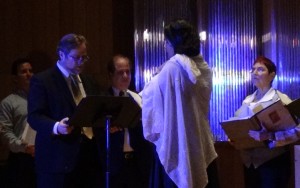
Ritual: Mattathias (Raphael Frieder), Jonathan (Moshe Bear), Dinah (Galit Dadoun Cohen), Simon (Helene Williams)
was continuous. (Not coincidentally, that the ravaged woman was named Dinah, modeled after Jacob’s daughter Dinah whose rape is described in Genesis, 34.) Lehrman’s music throughout the opera is far from diatonic, sometimes bordering on atonality, but imbuing a tonal lyricism in key moments of reflection. Mezzo-soprano Galit Dadoun Cohen had the requisite dark quality of voice to convey her shamed character. She is forced by the High Priest Mattathias to undergo the “bitter waters” ritual of the Sotah (as described in Numbers, 5). Mattathias, strict upholder of the law, was portrayed in an authoritarian yet sympathetic vein by baritone Raphael Frieder. He was particularly lyrical in his “Law” aria. His music is stately and rises inexorably in pitch, with dissonant filler in the accompaniment as if to say, “this is the law, but I disagree with it.”
The lead role of Hannah was superbly played by Meredith Greenberg. Her lyric soprano was perfect for the role. As described in her bio in the program, Greenberg remarked, after auditioning for the role, “This is a role for me!” She first sings a “Consolation Duet” with Dinah after the latter fails the “bitter waters” test. Hannah’s love duet with her betrothed Eleazar, sung by David Katz, a most ingratiating tenor, was one of the highlights of the opera. Lehrman and his co-librettist, Orel Odinov Protopopescu, drew texts from 36 psalms and 24 books of the Bible and the Apocrypha. For their love duet, segments of the Song of Songs was the textual source. With a Chopinesque and Brahmsian accompaniment, this love duet soars to a Puccinian climax, eliciting a warm and rare mid-act applause.
An undercurrent theme in the opera is the ancient custom of “droit du seigneur.” (This
is also a theme in Mozart’s comedy Le Nozze di Figaro.) This was the right of the master or lord to spend the wedding night with a newly married woman of a lower status. The thought of this horrific custom repels Hannah. A stark juxtaposition of the role of men vs. women is intoned by the chorus as the men chant, “I thank Thee Thou has not made me a woman” while Hannah intones, “Show us the way to a law which is human.”
A Lisztian style prelude opens Act II, with Mattathias singing a “Vanity” aria (reminiscent of Hans Sachs’s monologue in Act III of Wagner’s Die Meistersinger). As Hannah readies herself for her wedding to Eleazar, the women, acting as bridesmaids, sing a chorus, with harmonious 3rds, with color added by the organ, tambourine and a violin obbligato, played by Audra Moricca. At the wedding, Mattathias reads the Ketubah (Jewish wedding contract), but when he gets to the text which declares that the bride is “property,” Hannah abruptly stops the procedings and as a gesture of defiance, strips off her clothes (echoes of Salome). The congregation is scandalized and Hannah’s brothers are outraged, declaring her a harlot. Only Eleazar sides with her. Hannah declares that her nakedness (discreetly hinted at; by no means literalized) is no disgrace compared to the guilt of those who would allow her to be forcibly taken on her wedding night by the evil pagan overlord Nicanor, who appears for the first time in the opera. His role was played to the hilt by Erik Contzius, from his Middle-Eastern tunic-like outfit to his haughty, smug sneering. In an intricate ensemble, as befitting a finale, the chorus comments on this shocking turn of events. Here and at other points in the opera, Lehrman writes polyphonic ensembles with staggered entrances, carefully cueing each voice part. The ensemble sounded appropriately chaotically organized.
In Act III, the story of Shechem is recounted (Genesis, 34) where Jacob’s daughter was raped. Quoting from Genesis, just as Dinah’s brothers were out to exact revenge, here too Dinah’s cousins state, “Our sister shall not be treated as a whore.”
The second scene of Act III takes place in Nikanor’s palace, where he haughtily insists
on the superiority of the Greeks and the divinity of King Antiochus. In what became a defining moment of the Chanukah story, Nikanor insists that the Hebrews bow down to the statue of the King. Mattathias seizes a knife and attacks Nikanor, who stabs Eleazar to death in the scuffle. Immediately, Judah and Jonathan kill Nikanor, as the Hebrew men attack and kill the Greeks (just as Simon and Levi did to Shechem, his family and the townspeople after the rape of Dinah). Though Eleazar dies, Mattathias leads the Hebrew people to live by a code of freedom, not to oppress others, but also not to endure oppression. “Never use the law to force others to joint our faith” is his motto.
Particularly noteworthy in the cast was Helene Williams in the trouser role of Simon. Her focused lyric soprano and her young boyish movements aptly conveyed the character of the young lad. Others in important roles were Janet Leuchter as Mattathias’s wife, Zipporah, Moshe Bear as Jonathan and Jonathan Kline as Judah.
Leonard Lehrman has written an important and accessible opera in Hannah. One hopes that a future performance can be fully staged and orchestrated. I’m sure there are many colorful instrumental timbres hidden in the piano version of this ambitious score.
Visit Leonard Lehrman at http://ljlehrman.artists-in-residence.com/.
Comments Off on Hannah – A Review by Jonathan Dzik
Sorry, comments are closed.

